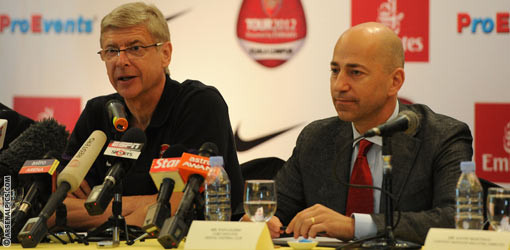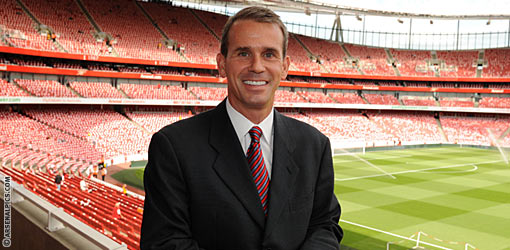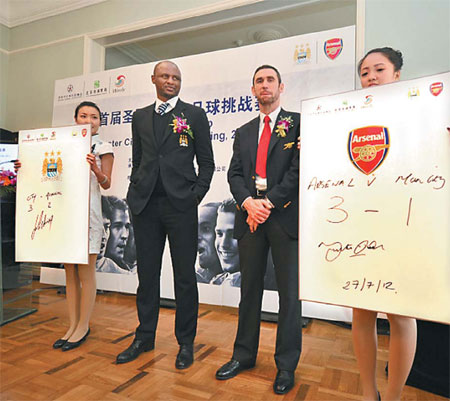Arsenal: Lukas Podolski, Robin Van Persie and the New Era, Part 7
August 9, 2012
Two fears—or shall we say aspirations—cross paths rather resolutely and remain at variance: The expectation of sport fans versus that of the administrators of the clubs to which the fans dedicate their affections and loyalty.
This cross purpose receives a good definition from Roger Bennett, writing in response to the current Glazer odyssey that has overtaken Manchester United fans. He calls this a gap:
Crudely put, this gap in Manchester United's case pits those who revere the 134-year-old club as the hallowed home of Bobby Charlton, George Best and Eric Cantona, and who expect the transfer market to be the priority destination for the club's commercial profits so it can add to a record-haul of 19 league titles, against others who are perceived to view United primarily as a platform to sell 2 million jerseys a year, engage 26 million Facebook followers and profit personally from the team's status as the richest side in the world (according to Forbes, which estimates it to be $385 million more valuable than the Dallas Cowboys and New York Yankees).
Let me beg the reader's indulgence to quote from one of my favorite passages in literature, the description of Mammon in Milton's Paradise Lost (Book 1, lines 679-684):
Mammon, the least erected Spirit that fell
From heav'n, for ev'n in heav'n his looks and thoughts
Were always downward bent, admiring more
The riches of Heav'ns pavement, trod'n Gold,
Than aught divine or holy else enjoy'd
In vision beatific.
One could say that the vision of the fans is always and firmly "downward bent," fixed on the playing pitch, admiring the vision (if there's any) of trophies and titles.
Whereas on the other hand, one could claim rather pompously that the administrator must lift their eyes heavenward and think of the broader picture, contemplate their club's lot in the inevitable if uncertain tomorrow.
If the reader, being a fan as is this writer, feels somewhat agitated by this presumptuous claim, he or she needs only realize that all it takes is a quick inversion of the logic and the entire thing boomerangs.
It is the precise point of the Bennet quote, and it is the fear articulated in Lady Nina Bracewell-Smith's tweet, referenced in Part 5 of this series.
Let me recall the tweet:
The question she raises is the effect of the Americans on Arsenal, the people coming from abroad, who may or may not know "sweet FA about football," to quote Peter Hill-Wood once again.
In the last part, a part that got lost in the commodious holds of B/R (but which the reader who missed it may find here), I examined Ivan Gazidis, one of these supposed Americans.
There we found that he isn't American at all and that he knows a good deal about football, that it can be rightly claimed that he is sport administrator of some note.
At the conclusion of that part, I proposed to examine his achievements so far at Arsenal and what his vision for Arsenal might be, and whether or not he is effectively executing David Dein's erstwhile role at the club.
When he was unveiled in November of 2008, to assume duty in January the next year, the following was the concern of the Arsenal Supporters' Trust:
This is a vital appointment at a time when Arsenal face challenging times on and off the field. The most pressing item in his in-tray is seeing through the completion of the Highbury Square property development in the face of the severe economic downturn.
His experience of international sports marketing should help the club to grow its income stream at a time when there should clearly be no further increase in ticket prices for the hard-pressed supporter. We also note his experience in managing player contracts, a skill set we hope he will soon put to use at Arsenal.
Gazidis had stated that the club's tradition, which involved 13 Premiership titles and 10 FA trophies, besides its globally recognized name and its revered financial model, was the reason he agreed to be the club's CEO. Even though he had rejected a similar offer from Manchester City previously, a club of which he had said he was a supporter.
Ivan Gazidis and Arsene Wenger. Photo courtesy of Arsenal.com.
What Gazidis encountered when he assumed duty was the challenge referenced in the Arsenal Supporters' Trust statement.
At the time, the global financial downturn was in full swing and this was causing problems for Arsenal, who were on the brink of defaulting on the loans they had taken to build the Highbury Apartments.
They realized that their stipulated one year for paying off the loan was no longer feasible. The banks, though, would not budge on the loan contract.
Jeremy Wilson of The Telegraph, writing in February of 2009, stated the following:
Arsenal's repayment of their £133 million loan for the property development of Highbury has today come under fresh doubt after the club admitted that they are in negotiations with a syndicate of banks over extending the term of the loan.
The club had initially outlined an expectation to repay the loan within one year of the accounts to the end of May 2008 but, according to their new half-yearly accounts, they are now spreading the expected repayment schedule as potentially beyond the current bank deadline of April 2010.The downturn in the property market is to blame, with the club admitting that they are now uncertain whether a "satisfactory agreement" will be reached with the banks.
The club's supporters responded to the situation with fear. Again, Jeremy Wilson:
The wider fear among some supporters is that money from the football side of the business could eventually have to be used to pay back the loan. Arsenal, though, have been consistent in stressing that the two sides of the business are financed independently of each other.
The wider fear among some supporters is that money from the football side of the business could eventually have to be used to pay back the loan. Arsenal, though, have been consistent in stressing that the two sides of the business are financed independently of each other.
Despite this assurance, "the wider" fear was quite palpable. It is articulated in the following by a supposed club source:
I don't think they will take money across, but money they thought they would free up over time is not coming through. They took the risk of being property developers and maybe they should have stuck to what they knew.
I don't think they will take money across, but money they thought they would free up over time is not coming through. They took the risk of being property developers and maybe they should have stuck to what they knew.
Peter Hill-Wood's words in response to the situation were carefully calibrated and not unreassuring:
Clearly there are some significant challenges ahead of us, both on and off the pitch, over the closing months of this financial year and beyond. We are closely monitoring the position with a view to ensuring, as we always have done, that the Group is on a robust footing and ready to respond to any challenges this exceptional economic climate may bring.
In the face of this situation, Ivan Gazidis proved his mettle as a negotiator and earned immediate praise from Arsenal supporters.
Tripp Mickle, writing for Sports Business Journal, recalls:
"Gazidis worked with the banks to reschedule the loans, which bought the club a year to get its fiscal house in order. It went on to sell 362 private apartments at Highbury Square and generate $300 million."
According to Gazidis, "that wasn’t a strategic issue or an issue of setting a new direction for the club, but it was one of the most pressing." And indeed it was.
For Gazidis, it is important that reaction to a previously unforeseen situation be differentiated from a strategic one, one which is his overarching challenge.
This is stated in the second part of the Arsenal Supporters' Trust statement referenced above—the issue of marketing and generating commercial revenue for the club, an area in which Arsenal are severely deficient, at least as they compare to their top competitors.
Mickle notes that:
Manchester United and FC Barcelona brought in $133 million and $166 million, respectively, in sponsorship revenue in 2011, while Arsenal brought in just $71 million. Arsenal has just eight sponsors, and its jersey sponsorship reportedly is worth less than half of Manchester United’s deal with the insurer Aon.
One of the major causes of this discrepancy is Arsenal's kits sponsorship, in which they are tied until 2014. It is a problem they've tended to draw criticism for, but as Lady Nina Bracewell-Smith notes, at the time this deal was struck, it made business sense.
The deal, struck in 2004, was the final piece that convinced the banks to give Arsenal the necessary loan required to finance the then-Ashburton Grove stadium project. Until then, the banks had been unwilling to provide the requested finance.
The deal 10-year, £130 million deal began with an initial payment of £55 million that year by Nike.
As noted above, although the deal was a good one at the time, it has since proven to be a commercial drag for Arsenal.
The Future
Gazidis continues to emphasize the fact that generating commercial revenue is the most critical issue for Arsenal right now if they are to narrow the financial gap between them and the likes of Real Madrid, Barcelona, Manchester United and Bayern Munich.
Since his appointment, Arsenal have added a few more sponsors to their commercial package, including Indesit, Citroen, Carlsberg, Thomas Cook Sport, Betsson and Airtel.
But even so, they are still behind Manchester United in this area. Mickle continues in his report:
The Indesit deal gives Arsenal a total of eight partners. By comparison, Manchester United, which generates the most commercial revenue of any Premier League club, according to Deloitte, has 21 partners, including separate telecom partners in India, South Africa, Malaysia and other markets.
But despite this disadvantage, Arsenal continues to try to narrow this gap. To this end, Gazidis hired Tom Fox to oversee this venture.
Tom Fox. Photo courtesy of Arsenal.com.
Sports Pro posted this entry on July 27, 2009:
Ivan Gazidis, Arsenal Football Club’s new chief executive, has hired Tom Fox to be the English Premier League club’s chief commercial officer. Fox is a veteran of the sports industry having worked at the National Basketball Association, Nike and Gatorade.
Fox has since acknowledged the challenges this venture posts, but remains optimistic that Arsenal will get a breakthrough in this area.
For eight years, the club was focused on transforming itself through concrete and pouring a new stadium. We’re focused on transforming it through people, and none of us thought that would be easy or fast. The changing of a culture takes time.
In the last two years, Gazidis and Fox have taken steps toward positioning "Arsenal to sustain its matchday revenue and increase commercial income."
To this end,
They have built a sponsorship sales and servicing division, revamped premium seating, enhanced membership packages and taken the club on an international tour for the first time in 12 years. They expect all of those efforts to begin paying off this season with increased revenue.
A five-year plan has been earmarked, which, according to Fox, the club is way ahead of achieving. What the eventual result will be, though, remains to be seen.
Anxiety about further revenue gap between the club and its rivals remains real, especially in the light of Manchester United's recent deal with Chevrolet, although that deal comes shrouded in mystery.
The recent focus on touring is a big step toward lessening this gap.
Before now, Arsenal have failed to realize the commercial advantage that lies in doing so. As such, they had ceded this terrain to the likes of Chelsea, Liverpool and, of course, Manchester United.
The new commercial venture in Asia. Photo courtesy of China Daily.
When Arsenal took to the field to face Manchester City in the Bird's Nest stadium in Beijing, China in a high-profile friendly two weeks ago, it wasn't just a preseason routine; it was, rather, a huge financial endeavor, one of such high-profile matches Arsenal hope to be involved with in the near future.
The financial possibilities that Asia offers are immense, and Arsenal are determined not to lose out here. It is a gold rush of sorts, on which other Premier League clubs are determined to cash in.
For the cynics, though, the cross purpose which we referenced at the beginning of the article remains unbridgeable. For them, any talk of brand building is merely business, as though to say business were unnecessary in sports.
But the real question of motive remains relevant. Who is Gazidis a servant of, Arsenal (the club) or Stan Kroenke his boss, who stands to reap the huge dividends that comes with the club's increase in value?
Gazidis remains adamant about the board's focus on the playing side of the club's endeavor.
We have to challenge for trophies...But we’ve got to do things differently because we don’t have those kind of resources [as Manchester City's]. Our approach is partly driven by vision, it’s partly driven by a necessary strategy.
We, as a club, have transformed ourselves in the last decade or so. We have no God-given right to be one of the biggest clubs in the world. It’s easy to lose perspective on what Arsene is trying to do, which, I think, is an extraordinary vision.
We’ve elevated ourselves into the ranks of the world-leading clubs because we’ve been really, really disciplined and based our strategy and decisions on clear-eyed assessments of the real underlying benefit to the club rather than the noise surrounding the game.
Gazidis also stressed that Stan Kroenke, who became the club’s owner in April, would not interfere with technical football decisions.
The Ghost of Dein
The idea that Arsenal have slacked off in the area of transfer purchases in the last seven years and that it is a result of David Dein's departure is a misconception.
The slacking off has been necessary and strategic. As I've said before, I do not see how Dein would have made any difference in the given financial environment within which Arsenal had to operate.
As to my claim that Arsenal need someone on the board biased toward the playing side of the club's endeavor, I had said that this claim is based on two assumptions. The first of which being the reason Arsenal haven't been buying the so-called world-class talents, and I have just rejected that notion.
The second assumes that Gazidis, who took over Dein's responsibilities, is merely concerned with the club's business aspect, not the playing aspect. I do not believe that this is true. This view isn't unrelated to the misconceptions about Gazidis, that he isn't a footballing man at all.
But as we've seen, this isn't the case, either. ESPN Sport reports the following statement.
We have to take a step further and win the Premier League or win the Champions League - that's what our goal is.
We added an important player in Podolski and we will have the return of Jack Wilshere
this year, which will be a big boost for the team.
We are also talking to people in this summer's transfer market, I think there will be something exciting for our fans to be happy about.
We want to do business carefully. We don't have to add many players, but we have to be very selective. The players we add must bring something to the team.
That's what Wenger is doing and he's done a good job over the year to identify special talent. I am sure he will do it again.
If the current purchases are anything to go by, then Gazidis deserves to be taken at his words.
Whose interest is Gazidis representing? Getty Images.
The New Era
So far I have said that six things are required to usher Arsenal into a new era.
They include the club being able to retain its players; the reason I have felt that it might be best for Arsenal to hold Robin van Persie to the terms of his contract (although the contrary situation might be more prudent).
The second requires that the club makes the playing aspect the main reason for its financial prudence; the reason for the said biased toward the playing aspect.
I have to conclude that there's nothing that shows that Gazidis isn't a person concerned with the playing aspect. I do not, therefore, think there's any need for a specific person for this differentiated role on the Arsenal board.
The third of the six things involves aggressive strategy toward closing the huge gap in commercial revenue between the club and its rivals.
This is exactly what Gazidis and Tom Fox are focused on.
++++
I thank the readers for their patient following of this series. There is at least one more part to go in the series.
Please, subscribe to my Twitter account (Gol Iath@gol_iath) so you can be notified about new articles.




